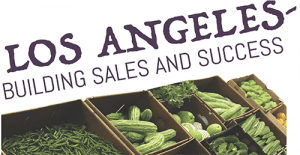The outlook for the Los Angeles produce scene is predominantly buoyant. Chefs are showcasing more fruits, vegetables, and herbs; schools and institutions are stepping up their produce game; and health-focused Angelinos are purchasing ingredients and preparing meals as a form of entertainment.

Southern California is a highly competitive retail market and stores are now featuring larger produce departments. Upscale retailer Bristol Farms has opened its first food hall-styled store, a 25,000-square-foot location with 5,000 square feet dedicated to 600 SKUs of mostly (80 percent) organic produce.
Talia Shandler, director of fruit purchasing for Shapiro-Gilman-Shandler Company, sees one of the biggest challenges as being able to define who your customers are.
“The lines between shippers, wholesalers, and grocers are becoming blurred. Everything comes down to reinforcing that we can honor ads and be competitive,” she says. “Wholesalers have to be able to commit to pricing for ads, and [then] we’re able to go the several different growers who can commit to the sale at the retail level.”
Sam Thakker, sales manager at Daaks International LLC, which is located just off the market,
believes the way we purchase produce will continue to evolve.
“Online grocery sales will grow 15 to 20 percent; all the apps have add-on services that deliver to customers. Even though brick-and-mortar stores are disappearing, you’ll still see grocery stores because people need to use their senses for purchasing produce.” When it comes to delivery, he notes, “Drones and driverless trucks are coming—we all have to adapt.”
“Trucking is becoming more of an issue,” says Cole Firman, salesman at specialty wholesaler Coosemans LA Shipping Inc., Vernon. “We’d like to do two drop-offs versus 30. Too many becomes expensive and growers may want to consolidate and have just one company selling their products.”
“I would like to see the (the market) become more of a consolidation hub and provide more service to local and national customers,” says Francisco Clouthier, president of Maui Fresh International LLC. “As for the future, given all the regulations in our business, companies that invest in food safety and nurture good relations with suppliers will thrive.”
Dana Thomas, president of Index Fresh, Inc., a shipper and importer of avocados in Riverside, is bullish about avocados. “Demand will keep outpacing supply—60 percent of households buy avocados, but what about the other 40 percent? There’s a lot of opportunity there. I’ve been in avocados for 40 years and I’m more optimistic than ever.”
Ray Davis, president of Pacific Sun Distributing Inc., Vernon, is enthusiastic about the future. He attended a Produce Marketing Association event in Monterey in July and “was amazed at the number of young, educated people participating in the seminars. Everything is more complex and faster paced, but they’re fantastically prepared. In addition, farmers are using better practices with fewer chemicals and pesticides to grow new varieties. It’s a really good time for the produce industry.”
For Firman, the use of social media is paying off, with wider implications for the future. “Social media is here to stay as a tool to promote our company and products. When we have something new and put it out on Instagram, we get a response immediately.”
In her neck of the woods, it’s all about trade. “With the uncertainties of tariffs and trade wars, politics is always a concern, but we take each day as it comes,” says Lynnette Keffer, president of customs broker J & K Fresh LLC, located in El Segundo. “When I look ahead, I see continued growth — produce is a good business.”
This is an excerpt from the most recent Produce Blueprints quarterly journal. Click here to read the full article.


